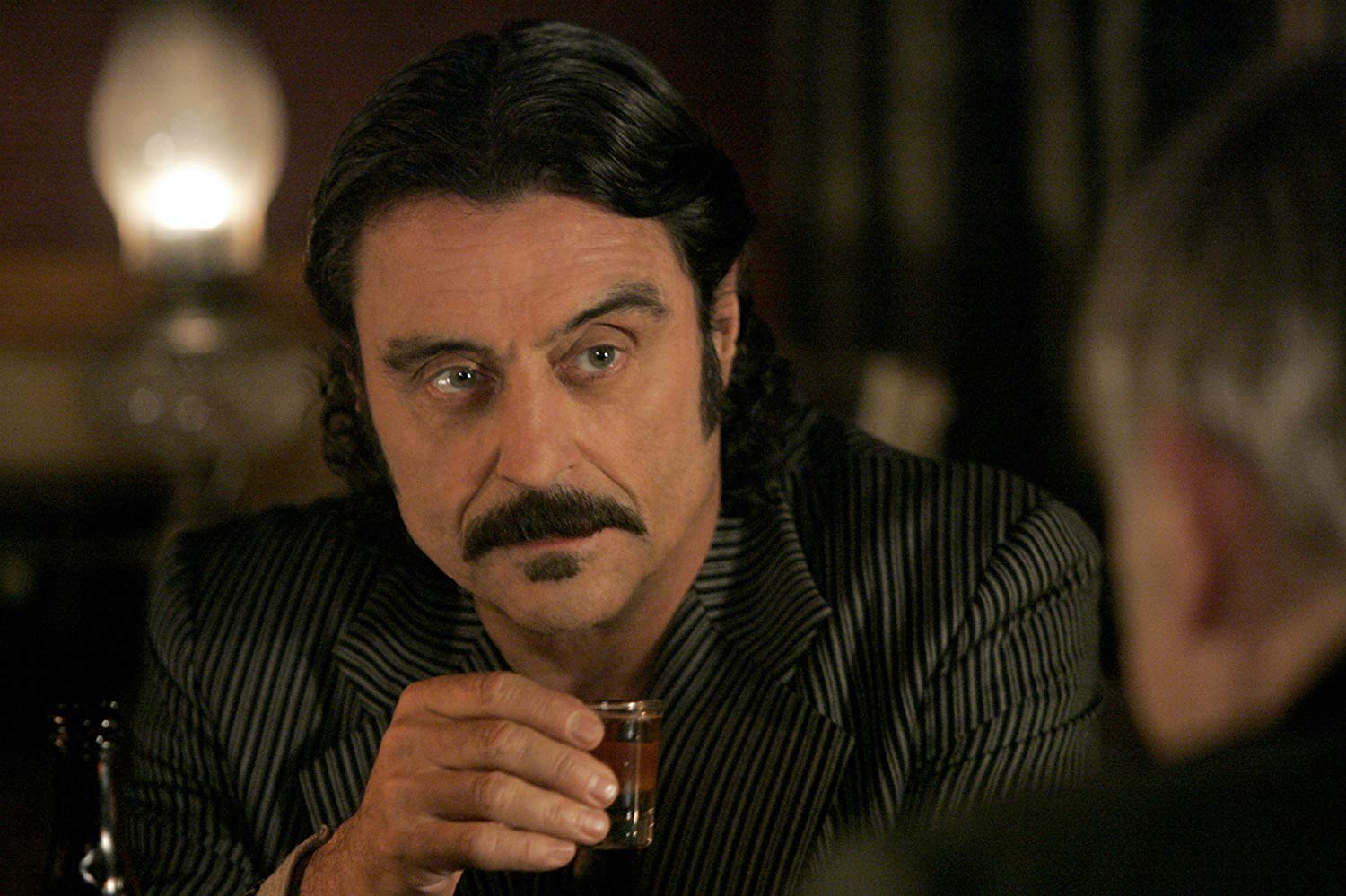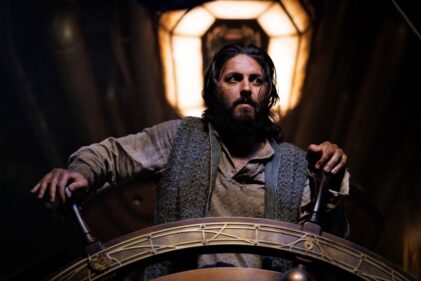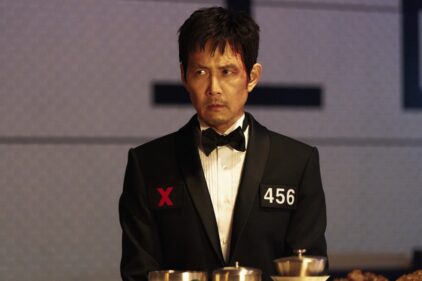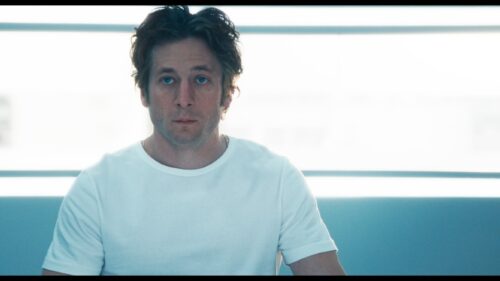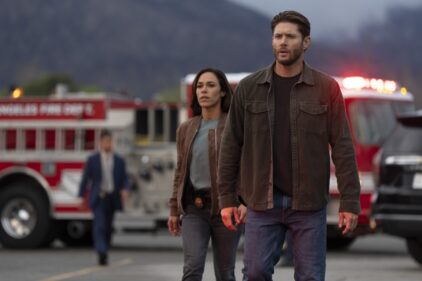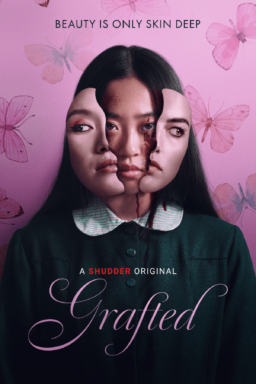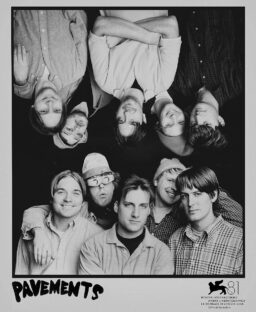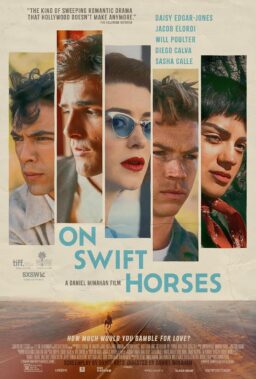It’s the first morning of my first trip to the Television Critics Association press tour, and I’m nervous. Sitting outside a ballroom at the Beverly Hilton, my mind races down the F.A.Q. one might keep tucked away in one’s brain for just such an occasion—Where do I sit? Will there be somewhere for me to plug in my computer? Should I ask questions? Can I ask questions? What if it’s a dumb question and they think I’m a fraud? Wait, am I a fraud? I’m a fraud, aren’t I? Oh god, what am I doing with my life?—when another writer, The A.V. Club’s Danette Chavez, appears like a miracle at my side and kindly mother-hens me toward the door, answering the more rational of my questions in a matter-of-fact way. She tells me about seating and power outlets and photos and so on; she assures me it won’t be nearly as overwhelming as it might seem.
Then we walk into the ballroom and within minutes I’m at a Delos counter, forced to choose: am I a black hat, or a white hat? Polite inquiries are also made about the bigness of my head, a line of questioning never depicted on “Westworld.” I confirm that yes, I have a very large head, and walk away, questioning the nature of my reality.
HBO’s panel isn’t nearly the terrifying experience I dreamed up, but overwhelming is, in fact, the best word for it. After selecting my black hat—for sartorial reasons—there are no more requests to interrogate my innermost nature. What there is instead is news, and it starts with news of the sort that TV writers simply lose their minds for—or this one does, at least.
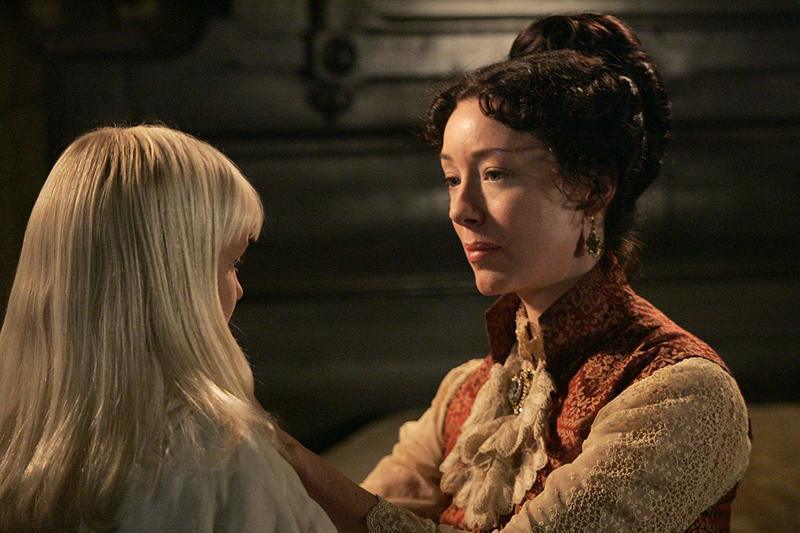
Casey Bloys, President, HBO Programming: “Deadwood” Returns
The “Deadwood” movie is officially alive. Bloys starts his executive session off with that right-out-of-the-gate announcement, telling the TCA that the next, and presumably final, saga of David Milch’s revered Western has been greenlit by the network. “We’re looking at an October start date,” he told the audience. “Dan Minahan is gonna direct it. Carolyn Strauss, Gregg Feinberg, David Milch, all of these people have worked very hard to get this together … it has been a logistics nightmare, getting all the cast members’ schedules lined up, but we are there and it is greenlighted.”
When pressed, Bloys says that the network is hoping for an air date in the spring of 2019, but feels we really ought to be satisfied with the fact of its existence alone, which: fair.
It’s easily the biggest, but is far from the only, piece of news from Bloys. He also confirms that “Confederate,” the controversial series from “Game of Thrones” heads David Benioff and D.B. Weiss, still has a pulse: “[Weiss and Beinoff] have gotta finish the final season of ‘Game of Thrones’ … And of course [they] have the ‘Star Wars’ movie. When they figure out their schedules they’ll come back to us. But nothing has been written and so no change in status there.”
Also of note: repeated assurances that the AT&T/Time-Warner merger will not “dilute the HBO brand,” despite a tone of a recently leaked meeting between the new head of Warner Media and HBO’s CEO: “No one is asking us to take pitches of a ‘Love Boat’ reboot or anything like that.”
Other highlights: the five potential “Game of Thrones” spinoffs have been narrowed to one, though others may still be developed; “Game of Thrones” will return in the first half of 2019; “I have a newsflash, Meryl Streep is very, very good” in season two of “Big Little Lies”; buying “The Tale” at Sundance was a positive experience and he imagines they’ll do more of the sort in future.
“Last Week Tonight with John Oliver”: On the power of saying “I can prove that’s true.”
To try to summarize Oliver’s energetic conversation with TCA writers is a fool’s errand, and I shall not attempt it—when the subject of such a panel is witty, well-informed, and thorough for a living, his answers to questions will be pretty darn good. So let’s just stick with this particular gem, delivered in response to a question about the episode in which he bought, and then forgave, $15 million in medical debt:
“It’s one thing to say, you know, there are predatory companies that can buy people’s medical debt, and then turn their lives upside-down in the process, and the barrier of entry is too low to get into this. Saying that is true, but it feels like it kind of lands a little harder occasionally if you say and the barrier is too low to get into this, and I can prove that’s true. I am now a medical debt company, and I have done this. It’s kind of like showing that you have the ingredients for an atom bomb, and you shouldn’t have had access to those in the same way—I mean, it’s very rare that it works particularly that way, although, it did kind of with the church, as well, because it’s one thing to say churches are tax-exempt, and they can promise you anything and demand money. It’s another thing to say, ‘I am now a church. Send me money. We will cure your Lupus. Send me fucking money.’ That feels like you are kind of proving your argument in a slightly more visceral way. So that’s why sometimes we engage in those real-world examples.”
He also repeatedly invited the Olsen twins to prove that there are, in fact, two of them.

“My Brilliant Friend”: Elena Ferrante is “Like a Ghost”
The anonymity of the writer who works under the name Elena Ferrante is not what makes her books so good, but it’s a bit tantalizing all the same. Saverio Costanzo, director of the series adaptation of Ferrante’s book “My Brilliant Friend,” seems to agree.
“We have been [emailing] each other since the beginning … I don’t know who she is. I am not curious to know, actually. She was like writing with us from the beginning … She was collaborating a lot. She was not defending the novel she wrote. She was just trying to guard us from making mistakes. She is, in my opinion, a very good script writer … She can be very tough, but she can be also very gentle. But, you know, it’s –- like [working] with a ghost somehow. So, I’ve been writing [email] to someone who I don’t know who she is.”
Even in a crowded slate, “My Brilliant Friend” stood out. Look for it this fall.
“Jane Fonda in Five Acts”: A legend gets unsurprisingly candid
The phrase “living legend” gets tossed around with relative ease, but here’s a situation where it actually applies. The subject of HBO’s upcoming documentary takes to the stage with director and producer Susan Lacy for a candid conversation peppered with moments of refreshing, even moving, self-awareness. When asked what change in her life had the biggest impact on who she is, Fonda says “the Vietnam War,” without hesitation, adding that “prior to my becoming an anti-war activist, I had lived an eventful life, an interesting life, but a meaningless life. I was a kind of a pretty girl who made movies and [was] kind of hedonistic. And so when I decided to throw in my lot with the antiwar movement, everything shifted. Everything.”
That’s a pretty good indicator of the tenor of “Jane Fonda in Five Acts,” something Lacy echoes when she’s asked about the way the documentary opens (which I won’t ruin here, but it involves Richard Nixon): “I wanted a signal that this was not a film about a movie star. I wanted to signal that right up front. Jane is a great movie star, she’s a great actress but that is not I think the heart of her story.”

“Camping”: A charm offensive and a conspicuous absence
The tempo for the session centered on “Camping,” the latest comedy-that’s-kind-of-a-drama from Jenni Konner and Lena Dunham, is set by star Jennifer Garner, who begins the proceedings by trying to chat with co-star David Tennant, appearing via satellite, who can’t hear her greetings at first—”Can you hear us now? Tardis to David Tennant,” she says, to the delight of presumably many but certainly one (me). Before long, it’s all pelvic floors and paper planners, rattlesnakes and under-crackers, and references to a 400-hour gag reel of nothing but giggles. Fun and effervescence, loads of enthusiasm. Quite a show.
But it’s hard not to wonder how much of that conspicuous enthusiasm is meant to counteract the absence of Lena Dunham, first slated to appear in person, then via satellite, before HBO executive Amy Gravitt tells the audience that Dunham “got hit by the flu in New York.” The flu happens, that’s not weird. This particular flu, however, comes on the heels of the announcement that Dunham and Konner have parted ways as producing partners.
Konner, asked about the split, says that she and the absent Dunham “feel super lucky to have had eight amazing years together. That’s really long for a collaboration. And we just want to do different things. It’s like, there’s no drama to be found there. It’s just work. It’s just about the creative process.”
During the panel, Dunham sends a tweet about Frances McDormand. Frances McDormand is cool, that’s not weird.

“Sharp Objects”: Ending on time
The bulk of the session on “Sharp Objects,” HBO’s excellent miniseries adaptation of Gillian Flynn’s first novel, centers on characters, their language, their habits, and their sweating habits. That’s fitting, as Flynn’s novel is a dark character study disguised as a gothic southern murder mystery, wrapping a complicated, sometimes unlikable female protagonist in the kind of page-turning, reach-for-the-popcorn trappings one looks for in a beach read.
Great as that conversation is—listening to Patricia Clarkson, Chris Messina, breakout Eliza Scanlen, and unknown quantity Amy Adams talk about their craft is no small thing—the real news of the panel comes from showrunner Marti Noxon, who fields a question initially directed at Flynn with regard to a second season of the series.
“We’re not talking about a season two,” Noxon says firmly. “This is it.” And then, with a chuckle, “So bask in it while you can.”
A series ending where its source material does shouldn’t be surprising, but “The Handmaid’s Tale” is set to get up to 10 seasons, and while part of me (and many others) would love a chance to see more of Clarkson and Adams sparring, there’s something reassuring and satisfying about knowing that this limited series is, in fact, limited.
“Pod Save America”: O brave new world, that has such cameras in it
Like the “2 Dope Queens” before them, the gentlemen of the podcast “Pod Save America” are putting down their headsets and taking their show to your eyeballs. Asked about the changes the show will see now that it’s headed to television, hosts Tommy Vietor and Jon Lovett had two contrasting responses.
Vietor, all facts: “This will be four episodes from various locations across the country that will air as one-hour specials on Friday nights, [which] will be very similar to [our] live shows with some different … pieces that are special for HBO.”
Lovett, blowing minds: “Now, like, one of the biggest differences between the podcast and the show is that we’re gonna use cameras, visual cameras, so [you] can see people, because that was something that HBO made clear to us is actually really important to their format. Being able to see and not only hear, which is obviously a learning experience for us, but [one] we think is very exciting.
Other highlights from day one: A very promising panel on National Geographic’s “Valley of the Boom,” a hybrid narrative and documentary series that centers on the dotcom bubble with a streak of the irreverence of “The Big Short”; an appearance by Jeff Goldblum in support of his just-announced NatGeo series, “The Curiosity of Jeff Goldblum”; drinking a smoothie called “Bernard’s Brain Stimulant” or something like that and worrying I was going to find out I’m a Cylon—er, sorry, a Host. Wrong show.
Day 2: “Chopped,” Bobby Brown, a feminist British murder mystery, and Tom Arnold’s “”Hunt for Trump Tapes.”

